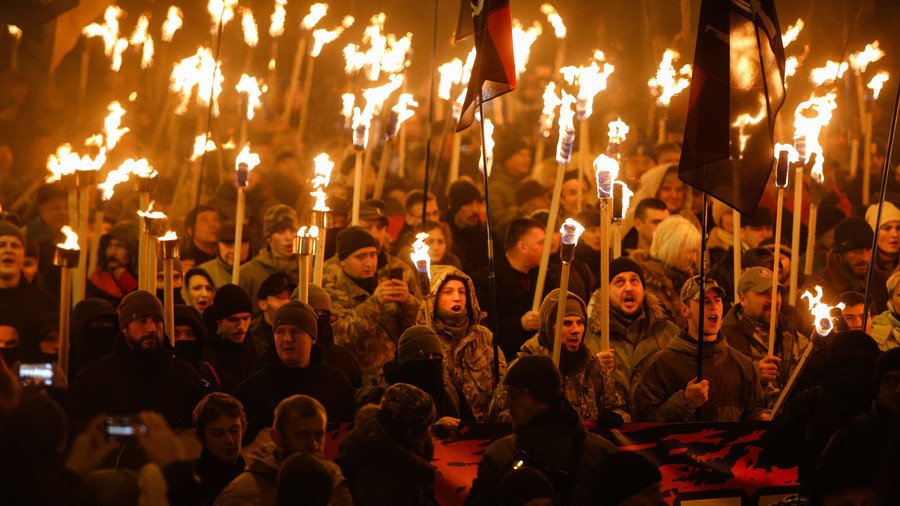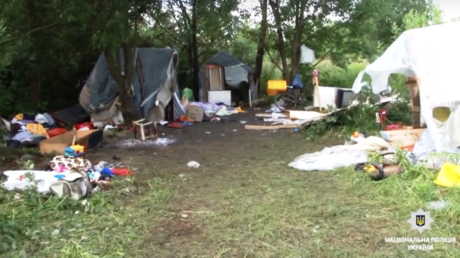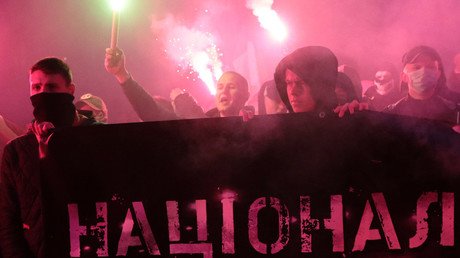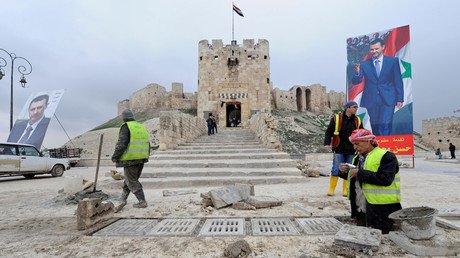Atlantic Council finally admits Ukraine’s Nazi problem, and seems upset RT reported it earlier

RT has accurately and consistently chronicled the rise of neo-Nazism in Ukraine. Now, rather belatedly, NATO’s principal mouthpiece has finally joined in, throwing some bizarre shade at this network in the process.
KRASNODAR - For the uninitiated, the Atlantic Council is NATO’s propaganda wing. And whenever its lobbyists, or guest writers, publish opinions which digress from the standard Washington foreign policy establishment position, it usually suggests a change in attitude is on the cards.
Last week, the “think tank” sent Ukraine a clear message: get your extremists & neo-Nazis under control promptly and start taking the threat they pose seriously.
In doing so, the Atlantic Council also finally acknowledged the problem exists. Something readers and viewers of RT have been aware of since the first Euromaidan protests back in 2013. However, for years, this reportage was dismissed by pro-NATO activists as “Kremlin propaganda.”
So what has changed? Well, Ukraine’s far right has become so emboldened that even the countries’ biggest defenders are beginning to realize the threat they pose to the narrative established since the 2014 change of power in Kiev.
Death at Camp
For instance, just this weekend near the western city of Lvov, a member of the Roma community was murdered during a pogrom. Additionally, others were stabbed, including an eight-year-old child.
Amid total impunity, Roma pogroms in Ukraine have now become deadly.Another Roma settlement in Lviv, biggest city of Western Ukraine, attacked overnight: one person is killed, many stabbed. Police detains 7 people, "considers" to open the investigation.
— Maxim Eristavi (@MaximEristavi) June 24, 2018
Farther eastwards, in the capital Kiev, for some months now, a neo-Nazi militia has been imposing its own order with street patrols. Meanwhile, the legal authorities either offer tacit approval or are helpless to stop ‘Azov’ – or perhaps a mixture of both.
While all this sounds like something from a history book, documenting the time of Hitler, Franco, and Mussolini, it’s the reality in Europe’s second-largest country today. And it’s clear that the mainstream media simply won’t be able to ignore the situation for much longer.
Indeed, even American state broadcaster RFE/RL has conceded that Azov’s induction ceremonies are “more reminiscent of 1930s Germany than of postwar democracy,” as they include nationalist chants, raised fists, "and a torchlight march through central Kyiv* (sic).”
Chance Gone?
But has the horse bolted? Many experts think so. Ivan Katchanovski, a Ukrainian emigre professor in Canada, has consistently warned of the dangers of appeasing ultra-nationalists. This weekend, he tweeted: “far right violence became normalized and mainstream in Ukraine following their crucial role in violent attacks during Maidan, (the) Maidan and Odesa (sic) massacres, war in Donbas & political assassinations. But Western governments and media chose to deny and ignore this. Now it is too late.”
His view is supported by Tarik Cyril Amar of Columbia University. “Timing mattered enormously: in 2014 Ukraine needed the West urgently. The West was engaged, rightly, but not as, literally, invested as now. That was the moment, obviously, not to let the far-right infiltration tactics pass,” he wrote. “That was also the moment when western intellectuals signed a letter to do precisely that - because: wartime emergency, Russian info war, blablabla. And that was the tip of the iceberg. To all those who joined what Andreas Umland later proudly called the ‘fencing season’ for the right: congrats. You now know how it feels to be a fellow traveler (sic).”
That was also the moment when western intellectuals signed a letter to do precisely that - because: wartime emergency, Russian info war, blablabla. And that was the tip of the iceberg.
— Tarik Cyril Amar (@TarikCyrilAmar) June 24, 2018
Thus, Atlantic Council’s volte-face is timely. But one wonders why the editor chose the title: “Ukraine’s Got a Real Problem with Far-Right Violence (And No, RT Didn’t Write This Headline).” Because it bears no relation to the writer Josh Cohen’s text, in which he doesn’t mention this network at all.
Judging Motives
My guess is the pressure group feels it has tripped over itself here. Because for some years now, it has been attempting to present everything RT reports as inadmissible, owing to its fears that Russian media threatens the dominance of the Western establishment press, which is overwhelmingly pro-NATO. And like all true believers, Atlantic Council lobbyists don’t tolerate dissent.
Yet, the simple fact remains: RT reported on Ukraine’s Nazi problem when mainstream outlets deliberately ignored this reality.
Back in October of 2014, I wrote: “If it walks like a Nazi and quacks like a Nazi – it’s the far-right,” adding “when correspondents in Kiev see Nazis, they report only the presence of far-right nationalists, a far more palatable term. Welcome to the bizarre world of Western media in Ukraine. A self-contained pit of rumor, fear, braggadocio and propaganda.” Earlier that month, I published “A journalist’s duty is to inform: have western press forgotten this in Ukraine?” Again, questioning why journalists refused to report the facts. After this, for challenging their groupthink, many of the Western ‘hack pack’ unfollowed or blocked me on Twitter: the modern form of journalistic ostracism.
In May of last year, as the far right became even more visible, I asked why “western reporters in Kiev continue to ignore the rise of Neo-Nazism in Ukraine." And five months later, I noted the lack of press coverage after “up to 20,000 far-right radicals honored the 75th anniversary of the Ukrainian Insurgent Army (UPA) – a paramilitary group led by Stepan Bandera, which actively collaborated with Hitler’s Germany. They brandished lit torches, smoke pellets, and flares as they chanted fascist slogans. And some participants openly gave Nazi salutes during the rally.”
So, readers of my columns, and of RT’s work in general, have been well aware of Ukraine’s Nazi problem while consumers of Western media are generally blissfully ignorant, as it has largely turned a blind eye.
Yet, the Atlantic Council routinely calls for restrictions on RT. Indeed, only last autumn, it wanted this network to be listed as a ‘foreign agent’ in the United States: a move which was clearly coordinated with policymakers because, within weeks, the wish was granted. Furthermore, a month later it dismissed RT as a “Low-Grade Platform for Useful Idiots.”
READ MORE: ‘Useful idiots?’ George Soros’ Prague lobbyists direct their fire at RT guests
Anyway, unlike the Atlantic Council, I am not in the business of telling people what to think. So, dear reader, you can work out for yourself the agendas at play here.
*‘Kyiv’ is the Latin transliteration of the Ukrainian-language spelling of the country’s capital city. In English it is known as ‘Kiev.’ However, for political reasons, many media outlets have taken to replacing it with ‘Kyiv,’ which is similar to using ‘Moskva,’ rather than ‘Moscow’ or ‘Sankt Peterburg’ in place of ‘St. Petersburg.’ RT, along with other serious news organisations, continues to use the correct English spelling.
Think your friends would be interested? Share this story!
The statements, views and opinions expressed in this column are solely those of the author and do not necessarily represent those of RT.

















